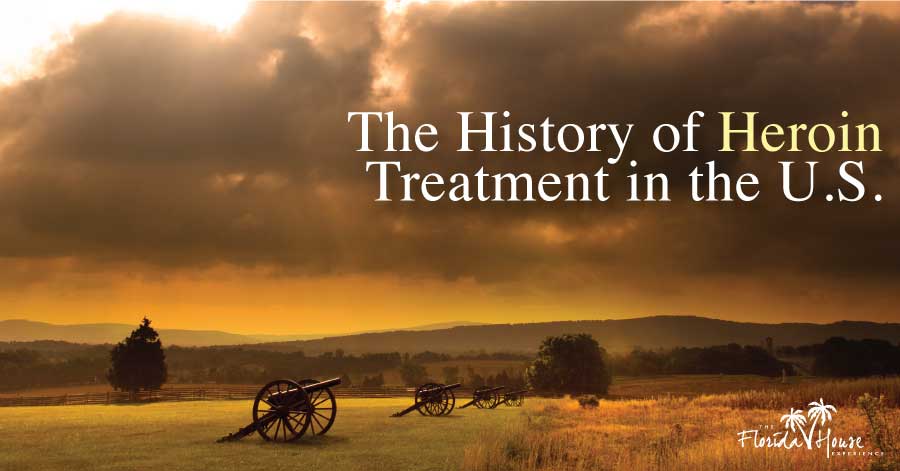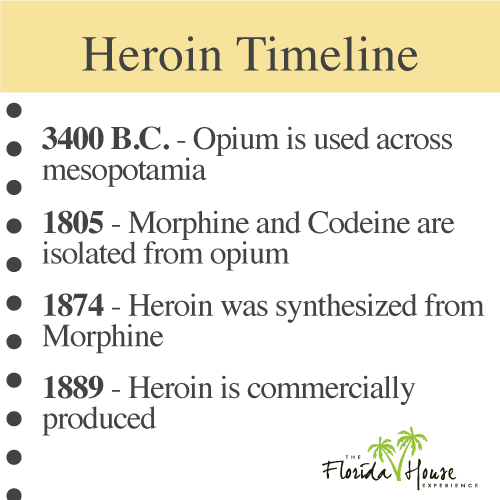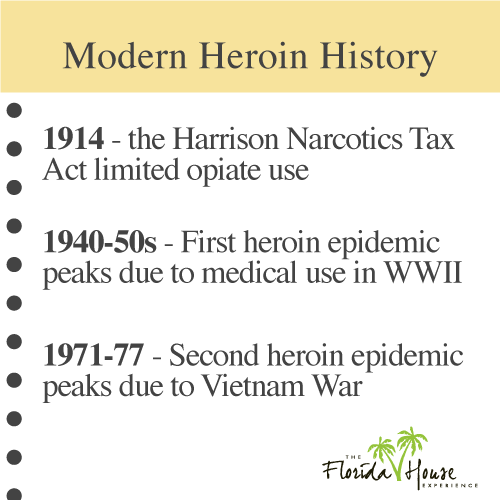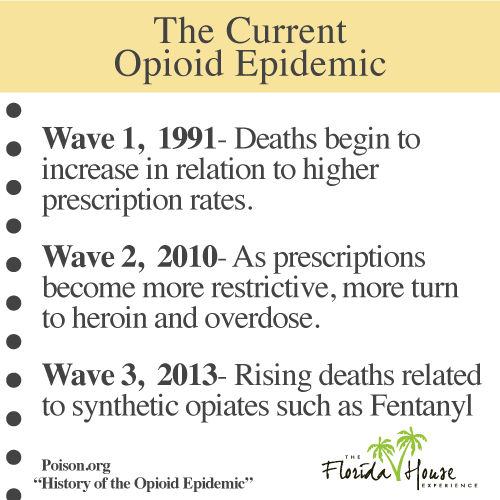
Although alarming amounts of heroin addicts have been present in the United States for over 150 years, the first adequate opioid addiction treatment facilities did not open up until the 1960’s. The slow regulation of opioid distribution after heroin was synthesized opened up a wide doorway for underground markets to emerge making it even harder to control the rising population of heroin addiction. Today, it is believed that almost 1 million people are affected by the opioid crisis that was started so long ago.
History of Opioid Addiction
 The first record of opioid addiction dates back to the mid-1800’s after the end of the U.S. Civil War in 1865 when soldiers were given narcotics to deal with the loss of limbs and battle wounds. This ultimately led to the earliest opioid addictions being deemed the “Army disease” because it mainly affected those who had participated in the war.
The first record of opioid addiction dates back to the mid-1800’s after the end of the U.S. Civil War in 1865 when soldiers were given narcotics to deal with the loss of limbs and battle wounds. This ultimately led to the earliest opioid addictions being deemed the “Army disease” because it mainly affected those who had participated in the war.
After heroin was synthesized in 1874, opioid addiction became even more prevalent because of the way narcotics were so easily distributed by physicians and pharmacists within the medical community. Heroin was often called the “wonder drug” that was claimed to cure any and all health problems and was supplied to patients in glass vials containing a hypodermic needle for injection. This is why a large number of heroin addicts started to emerge in the late 1800’s and early 1900’s.
Addiction declined from 1925-1950 though because of the Dangerous Drug Act passed by Congress in 1920 making the over-the-counter purchase of opioids illegal. Unfortunately, the black market for purchasing these types of drugs had already been established, which is why the addict population resurfaced in almost epidemic proportions after World War II.
Regulation of Heroin from a Legal Standpoint
Before 1890, opioid control laws were strictly on a city-to-city or state-to-state basis. After such immense amounts of addiction disorders were diagnosed in the early 1900’s, heroin became a controlled substance under the Harrison Act of 1914. This act required all parties involved in the manufacture, sale, and distribution of narcotics to register through the Federal Government. Although this prevented practicing physicians to prescribe narcotics over the counter, it did not control the use of heroin for addiction treatment.
It wasn’t until 10 years later in 1924 when the Heroin Act was passed that prohibited the manufacture and sale of heroin for any and all uses. But with any substance becoming illegal, there comes an underground market that emerges. Over the next 50 years, many acts were passed and groups formed by the Federal Government to regulate this ever-growing market. This included the DEA in 1973 that was created to target illegal opioid import and export trails and dealers.
Regulation of Heroin Treatment
 Although heroin became a controlled substance under the Harrison act of 1914, it wasn’t until 1919 that heroin addiction treatment facilities started to emerge. After only a couple of years of operation, they were closed down by the Federal Government because of the lack of inadequate treatment. Almost a decade went by before the U.S. Public Health Service stepped in and created treatment facilities in Lexington, Kentucky and Fort Worth, Texas. From 1935-the 1960’s, the facility in Lexington was the main center for heroin addiction research. It was where Dr. Vincent Pole and Dr. Marie Nyswander were the first to test and successfully prove effectiveness in the use of methadone to withdraw patients from heroin in 1964.
Although heroin became a controlled substance under the Harrison act of 1914, it wasn’t until 1919 that heroin addiction treatment facilities started to emerge. After only a couple of years of operation, they were closed down by the Federal Government because of the lack of inadequate treatment. Almost a decade went by before the U.S. Public Health Service stepped in and created treatment facilities in Lexington, Kentucky and Fort Worth, Texas. From 1935-the 1960’s, the facility in Lexington was the main center for heroin addiction research. It was where Dr. Vincent Pole and Dr. Marie Nyswander were the first to test and successfully prove effectiveness in the use of methadone to withdraw patients from heroin in 1964.
Methadone maintenance treatment was approved in 1972 by the U.S. Food and Drug Administration and became the main substance used to treat heroin addiction. The methadone was required to be strictly controlled to opioid treatment programs. Methadone maintenance remained the leading treatment until a new substance called Buprenorphine was approved in 2002 for office-based treatment. Today, Methadone maintenance and Buprenorphine are both used to treat opioid addiction, as well as other treatments like Suboxone® and Narcan.
Methadone Maintenance
For over 40 years, methadone is a medication that has been used to safely treat heroin addiction in treatment centers around the United States. The medication is a long-acting opioid agonist, or physiological response mechanism, that helps to block cravings and suppress withdrawal symptoms while going through heroin detoxification. It does not intoxicate or sedate the person while doing so. Tolerance to Methadone develops slowly, so it may be used for a long amount of time during the detoxification process.
Medication Assisted Heroin Addiction Treatments
 While Methadone maintenance has been proven very effective in the treatment of heroin addiction, there are other modern medications available, as well. Some of these include:
While Methadone maintenance has been proven very effective in the treatment of heroin addiction, there are other modern medications available, as well. Some of these include:
- Narcan (Naltrexone): This medication is injected into the outer thigh or in the form of a nasal spray that is used to reverse opioid overdose. It can quickly restore respiration to a person who is experiencing a shortage of breath or no breath while in the middle of overdosing.
- Buprenorphine: This is different than any other semi-synthetic opioid because it is only a partial opioid agonist. This allows the medication to have a lower potential for misuse and allow the patient less physical dependence while using it.
- Suboxone®: This is a type of medication created by combining Naltrexone and Buprenorphine, so it performs as both of them do. Suboxone® helps with overcoming withdrawal symptoms and blocks opioid receptors to a recovering addict’s brain.
Inpatient Treatment Facilities at Florida House
Heroin addiction is a very serious matter that requires intensive care and detoxification while going through the recovery process. If you believe someone you know or you yourself are struggling with an opiate addiction, our staff at Florida House is here to guide you in the right direction. Our inpatient treatment facilities, both the residential and intensive inpatient programs, will give you access to our onsite doctors and therapists in order to determine what the next step is for your recovery.
If you or a loved one is caught in the grips of heroin addiction, please do not hesitate to contact us today at (833) 596-3502 and get the help and information you need in order to release the hold it has on your life.






